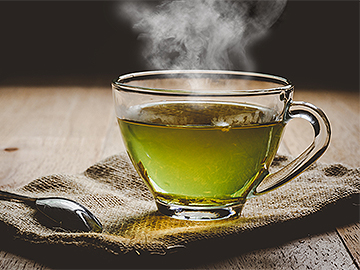Besides water, the two most popular beverages in the world are coffee and non-herbal tea. Coffee is the most consumed beverage in America while non-herbal tea — all varieties of which derive from Camellia sinensis — is the most consumed beverage in the world. Many people begin each day with either a mug of coffee or a cup of non-herbal tea (green, black, or oolong) to stymie drowsiness and increase energy and alertness. But coffee and non-herbal tea can do a lot more than perk people up: Both are packed with antioxidants and phytochemicals and are said to be effective at reducing the risk of developing Alzheimer’s disease and other dementias.
What the Science Says
 In 2016, a meta-analysis of 11 studies suggested that coffee consumption is associated with a reduced risk for Alzheimer’s disease. A 2021 study of individuals participating in the UK Biobank found that those who drank two to three cups of coffee or tea per day had a 30% lower risk of developing dementia or having a stroke than those who didn’t drink either beverage. Another 2021 study suggests that for individuals age 60 and over, coffee intake slows cognitive decline, reduces the risk of developing Alzheimer’s disease, and lessens the accumulation of amyloid — a biological marker for Alzheimer’s disease — in the brain. And a population-based longitudinal study published in 2022 determined that in individuals age 55 and older, a higher consumption of tea was associated with reduced cognitive decline.
In 2016, a meta-analysis of 11 studies suggested that coffee consumption is associated with a reduced risk for Alzheimer’s disease. A 2021 study of individuals participating in the UK Biobank found that those who drank two to three cups of coffee or tea per day had a 30% lower risk of developing dementia or having a stroke than those who didn’t drink either beverage. Another 2021 study suggests that for individuals age 60 and over, coffee intake slows cognitive decline, reduces the risk of developing Alzheimer’s disease, and lessens the accumulation of amyloid — a biological marker for Alzheimer’s disease — in the brain. And a population-based longitudinal study published in 2022 determined that in individuals age 55 and older, a higher consumption of tea was associated with reduced cognitive decline.
Coffee contains more than 1,000 compounds, and tea has more than 2,000 compounds. Even though scientists have begun to determine the specifics of which food compounds target specific human health issues, most of the phytochemicals in coffee and tea have yet to be investigated. Because both coffee and tea contain caffeine, researchers initially theorized that caffeine was the source of their neuroprotective properties. But studies on the relationship between caffeine and dementia have yielded mixed results. Scientists now believe that the flavonoids and other micronutrients in coffee and tea are responsible for each beverage’s neuroprotective properties.
Beneficial Compounds in Coffee and Tea
 Research indicates that the neuroprotective compounds in coffee include the following:
Research indicates that the neuroprotective compounds in coffee include the following:
- Anthocyanins
- Catechins
- Chlorogenic acids
- Caffeic acid
- Diterpenes (cafestol and kahweol)
- Trigonelline
 Some of the neuroprotective compounds in tea are as follows:
Some of the neuroprotective compounds in tea are as follows:
- Catechins
- Chlorogenic acids
- Kaempferol
- Theaflavins
- Theanine
- Thearubigins
Besides having neuroprotective properties, the compounds in coffee and tea may be effective against other health issues. For example, anthocyanins are anti-inflammatory and repair cell damage, protect against cancer, and reduce the risk of diabetes. Studies suggest that chlorogenic acids may lower blood sugar levels, protect against cancer, support healthy weight management, and reduce inflammation. Catechins have been proven to improve insulin sensitivity, increase fat burning, inhibit carcinogenesis and angiogenesis, fight inflammation and cardiovascular disease, and strengthen the immune system. And theaflavins are anti-inflammatory and may fight cardiovascular disease (especially arterial plaque buildup), kill cancer cells, protect skin cells from ultraviolet rays, and prevent fat deposits in the liver. So not only does drinking coffee and/or tea benefit the brain; it also benefits a number of other systems in the body. In fact, the combination of phytochemicals, vitamins, and minerals in coffee and tea ranks them among the healthiest beverages on the market.
When cognition declines, memories fade, faces become unrecognizable, and daily activities become nearly impossible. The consumption of moderate amounts of coffee or non-herbal tea increases the likelihood that seniors maintain not only good cognition but also good physical health. To encourage seniors to consume moderate amounts of coffee and/or tea, ensure that non-herbal tea and fresh coffee are available throughout the day.
